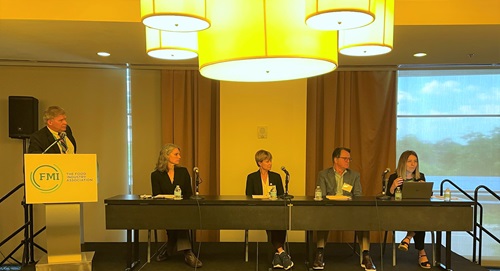Why Paying Attention to Gene Editing Is Important
Jun 2, 2022
By David Fikes, Executive Director, FMI Foundation
The other night my wife and I were debriefing about our respective days, conversing about work responsibilities, and I was telling her about the gathering the Foundation hosted sharing our most recent research on consumer attitudes regarding gene edited food products. I commented that with all the plethora of issues confronting the food industry — violence in the workplace, supply chain turmoil, economic concerns, and workforce challenges — it was difficult to attract industry attention to the introduction of gene edited food products into the marketplace. As she is prone to do, my wife confronted me with a tough question. She asked, “If the industry has all these other pressing concerns, why do you care so much about the gene edited food issue?“
 It was a fair and legitimate challenge, going right to the heart of the matter. After a long time considering different ways I could respond, I answered, “I am passionate about this issue because I live in dread fear that if we, as an industry, mishandle how these new biotech food products are introduced, our whole world could miss out on the potential benefits this biotech innovation would bring.“ This apprehension drives my sense of urgency in helping the industry be prepared for and participate in the introduction of gene edited food products. Based on prior experience, I am concerned if we are slow to address the issue, other voices will control the narrative, potentially crippling consumer acceptance to the point that we are delayed in reaping the environmental, improved food production, disease managing, nutrition improving advantages that gene editing can provide.
It was a fair and legitimate challenge, going right to the heart of the matter. After a long time considering different ways I could respond, I answered, “I am passionate about this issue because I live in dread fear that if we, as an industry, mishandle how these new biotech food products are introduced, our whole world could miss out on the potential benefits this biotech innovation would bring.“ This apprehension drives my sense of urgency in helping the industry be prepared for and participate in the introduction of gene edited food products. Based on prior experience, I am concerned if we are slow to address the issue, other voices will control the narrative, potentially crippling consumer acceptance to the point that we are delayed in reaping the environmental, improved food production, disease managing, nutrition improving advantages that gene editing can provide.
In a world where people can hold incredibly strong opinions, without bothering to check if they are based in science or fact or a recognizable reality, we simply cannot afford a “let’s wait and see” attitude when it comes to getting reputable information to the customer base.
Our Foundation-sponsored consumer research shows that most shoppers are not familiar with gene editing, nor are they currently able to differentiate it from other forms of biotechnology such as gene modification (aka GMO or BE). Naturally, given the human disposition to shy away from the unknown, consumer willingness to purchase gene edited food products is very low. Importantly, our research also confirms that consumers want to know how their food is produced and when provided with information about gene editing in general, why it was utilized, and the particular benefit it provides the shopper, their willingness to purchase a gene-edited product dramatically improves.
At the gathering I was describing to my wife; we presented our research on Consumer Attitudes about Gene Edited Food Products to a diverse group of more than thirty industry leaders. We had a panel of experts respond to the presented findings and they were asked the following question:
Clearly, the food industry has some work to do providing consumers with the necessary background about the value, the science, and the potential benefits of gene editing applications in food production, so who should be driving the train in helping the consumer understand this new technology? Retailers? Producers? Government? Seed Developers?
The consensual answer came back loud and clear that the most effective effort would be a collaboration of all the above. It needs to be a joint effort between government and the private sector. And every link in the food chain must do their part. To that end, FMI will continue convening these conversations, providing resources, and pushing for positive action.
To access the key findings document Consumer Attitudes, Trust, and Acceptance of Bioengineered and Gene-Edited Food under the National Bioengineered Food Disclosure Standard, click here.
Click here for a recording of the research presentation and industry discussion of Consumer Attitudes Toward Gene Edited Food Products.
Legal Disclaimer:
EIN Presswire provides this news content "as is" without warranty of any kind. We do not accept any responsibility or liability for the accuracy, content, images, videos, licenses, completeness, legality, or reliability of the information contained in this article. If you have any complaints or copyright issues related to this article, kindly contact the author above.
